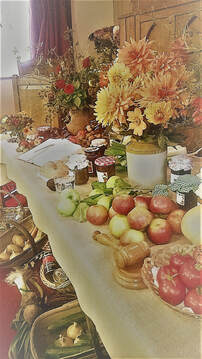A Blog for Harvest

It is that time of year when we celebrate again our Harvest Festival, a tradition in the church that seems to be as old as the hills. However, in fact, the celebration of Harvest Festival in churches is a relatively recent practice. It was the Rev Robert Hawker in 1843 who, noticing the revelry and feasting in his native Cornwall around this time of year, started the tradition of holding a service in his church offering communion bread made with the first corn of the harvest.
Of course, that would have been much earlier in the year than we celebrate Harvest today. Lammas Day (or Loaf Mass Day) or Lughnasadh on 1 August, was celebrated as the day of bread, when the locals would be encouraged to take a loaf of bread to a church service to celebrate the harvesting of the first of the crops. This was again a pagan celebration originated by the Celts who celebrated the god of Lugh on this day, but soon became a way of celebrating harvest in churches.
Michaelmas, or St Michael’s Mass was celebrated at the end of the harvest season on the 29th September, and at a time when all the harvest should have been gathered in. The end of the harvest was celebrated with huge feast, known as the Harvest Supper which was eaten on Michaelmas Day. Here the ‘Lord of the Harvest’ would sit at the head of the table, and the diners would be served goose stuffed with apples and a variety of vegetables. This gave rise to the Goose Fairs, the largest of which still continues today in the UK in Nottingham for four or five days around St Michael’s Day some 700 years later.
The traditions perhaps for our Christian celebration of Harvest stretch right back into the pages of the Old Testament. I read a short while ago that ‘all Jewish festivals are Harvest Festivals’ and I think there is more than a grain of truth in that. The Festival of Weeks took place seven weeks from the first corn being harvested, the Festival of Tabernacles took place seven days after the end of the harvest, and the Festival of Unleavened bread and Passover involved bread and an offering of livestock. The law instructed: “No one should appear before the Lord empty-handed: each of you must bring a gift in proportion to the way the Lord your God has blessed you.”
No matter how you might celebrate Harvest, whether pagan, or Christian or Jewish, it is good for us to recognise the ways in which we have been blessed, and to stop and give thanks for that which we have received. To recognise our dependence on one greater than us who supplies all we need, and to offer something back so that all may share in the feast.
Of course, that would have been much earlier in the year than we celebrate Harvest today. Lammas Day (or Loaf Mass Day) or Lughnasadh on 1 August, was celebrated as the day of bread, when the locals would be encouraged to take a loaf of bread to a church service to celebrate the harvesting of the first of the crops. This was again a pagan celebration originated by the Celts who celebrated the god of Lugh on this day, but soon became a way of celebrating harvest in churches.
Michaelmas, or St Michael’s Mass was celebrated at the end of the harvest season on the 29th September, and at a time when all the harvest should have been gathered in. The end of the harvest was celebrated with huge feast, known as the Harvest Supper which was eaten on Michaelmas Day. Here the ‘Lord of the Harvest’ would sit at the head of the table, and the diners would be served goose stuffed with apples and a variety of vegetables. This gave rise to the Goose Fairs, the largest of which still continues today in the UK in Nottingham for four or five days around St Michael’s Day some 700 years later.
The traditions perhaps for our Christian celebration of Harvest stretch right back into the pages of the Old Testament. I read a short while ago that ‘all Jewish festivals are Harvest Festivals’ and I think there is more than a grain of truth in that. The Festival of Weeks took place seven weeks from the first corn being harvested, the Festival of Tabernacles took place seven days after the end of the harvest, and the Festival of Unleavened bread and Passover involved bread and an offering of livestock. The law instructed: “No one should appear before the Lord empty-handed: each of you must bring a gift in proportion to the way the Lord your God has blessed you.”
No matter how you might celebrate Harvest, whether pagan, or Christian or Jewish, it is good for us to recognise the ways in which we have been blessed, and to stop and give thanks for that which we have received. To recognise our dependence on one greater than us who supplies all we need, and to offer something back so that all may share in the feast.
 RSS Feed
RSS Feed